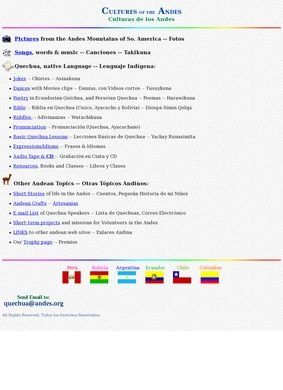Cultures of the Andes offers an in-depth insight into the unique cultures found in the Southern Andes Mountains. As an internet archive dedicated to showcasing the richness of Andean cultures, the website serves as an essential resource for those interested in this often underrepresented region.
One sterling aspect of this resource is its impressive collection of songs and poems in Quechua, the indigenous language of the Andes - a rare find on the internet. For the music enthusiast, the site provides an extensive selection of traditional music, each with their corresponding words and rhymes. Supplementing this with fascinating indigenous jokes, the website creates an authentic flavor of the native language, bringing the user remarkably close to the heart of the Quechua culture.
The site also provides a visual feast for the audience with pictures capturing the stunning landscapes and lifestyles of the Andes. Moreover, the addition of short dance movie clips enriches the user experience, generating a near-visceral encounter with Andean culture.
Furthermore, the site takes its educational role seriously by offering basic Quechua lessons. This not only allows for a more immersive cultural experience but also fosters understanding and respect for the Quechua language. Resources such as audio tapes, CDs, and an array of books are also furnished to augment the learning experience.
Lovers of literature will appreciate the short stories of life in the Andes section. These tales invite the reader on an intimate journey through the often harsh, yet immensely rewarding, realities of Andean living.
Another noteworthy feature of Cultures of the Andes is its section detailing opportunities for volunteers to engage in short-term missions and projects in the Andes, thereby providing a platform for first-hand experiences and interactions with these vibrant cultures.
Overall, Cultures of the Anodes is a comprehensive package, showcasing the diverse aspects of Andean cultures in one place, making it a vital tool for those interested in South American cultures. However, the rather dated website design and somewhat cumbersome navigation serve as the only minor flaws in this otherwise invaluable resource.
